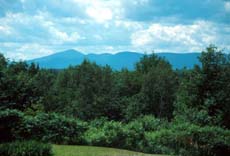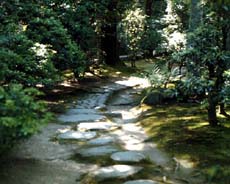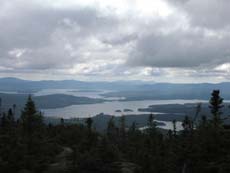Slowing down

Maine mountains

Isuien Garden, Nara, Japan

Heald Pond in Maine

Heald Pond in Maine

Mooselookmeguntic Lake, Maine
July 1999: For the past two weeks, I have been working on the text section where I urge greater complexity of places as a partial remedy against commodification* and simplified inhabitation. I urge linkage and contextual awareness to fight instant gratifications and isolated intensities. In the midst of this writing, I read Ann Cline's A Hut of One's Own: Life Outside the Circle of Architecture. She has a different strategy.
In societies like ours, where architecture and history make meaning out of vast and shifting complexities, the primitive hut is a search and attempt to pare away what is given and apparent, to find something else to satisfy our deepest emotions . . .
Within surroundings of material impoverishment and inverted, or upended, social hierarchy . . .
[Outside of] a world of anxiety and hyped values . . . a world clinging to remote controls of meaningless choice . . . huts have always been supremely at home . . . in the Buddhists' realm of non-attachment, in the humanists' world of skepticism. Free from aggressively righteous agendas, the wasteland welcomes a contingent community, a sangha of silence. Cline 1998, 109, 56, 130
Cline wants to create "a free zone, a place out of bounds" (65) by building structures released from the rush of institutionalized pressures. These slow us down to encounter ourselves, things, and other people, as well as our own basic desires and needs. She studies Japanese tea houses, Bronx casitas, garden houses, homeless people's constructions, architectural follies, all spaces for reality and self-discovery opened by deliberate action in marginal places. In them, Cline urges ritual. She imagines a future where such places for ritual become common and healing refuges (xiii). Cline does not propose ritual huts as The Answer to urban and suburban problems; she makes no claim that her prescription is sufficient, only that it would be helpful and may be necessary. Marginal places can provide a means to get in touch with dimensions of the reality of our world and our living that are occluded in the modern rush. It seems right that suburbia would be enriched by such places and such living.
I recognize with a shudder that she is pointing to something that is part of how I live, but has not had much part in what I have been writing. She is urging quietude, intense activity on a small, deliberately marginal scale, activity that is not an escape but a means of encounter and the revaluation of values.
To be frank, I am writing my defense of complexity and increased involvement while sitting in Maine looking out on a quiet forest pond, not a busy and complex city. Moving to Maine years ago was in part an attempt to do what Cline recommends, get away from the stream of expectations and academic business to find an outside place for slowed-down encounter, from which one can re-enter the swirl on one's own terms.
So am I being dishonest with all my talk of complexity and virtuality? Should I urge retreat and quietude? I tremble but refuse. Thoreau's hut was an easy walk from Emerson's dinner table and Concord's downtown; my Maine woods connect me to the world by car and Net, when I choose. Perhaps that's the point: Thoreau was no hermit; he chose isolation or immersion when appropriate. Cline argues rightly that we are in danger of being denied that choice. We may need the isolation of the hut, as well as its zone for self-aware sociality in a marginal place of mutual discovery. We do need to encounter the basics, but I insist that complexity is one of the basics. Its encounter, however, can take many modes, not all of them busy and fast-paced.